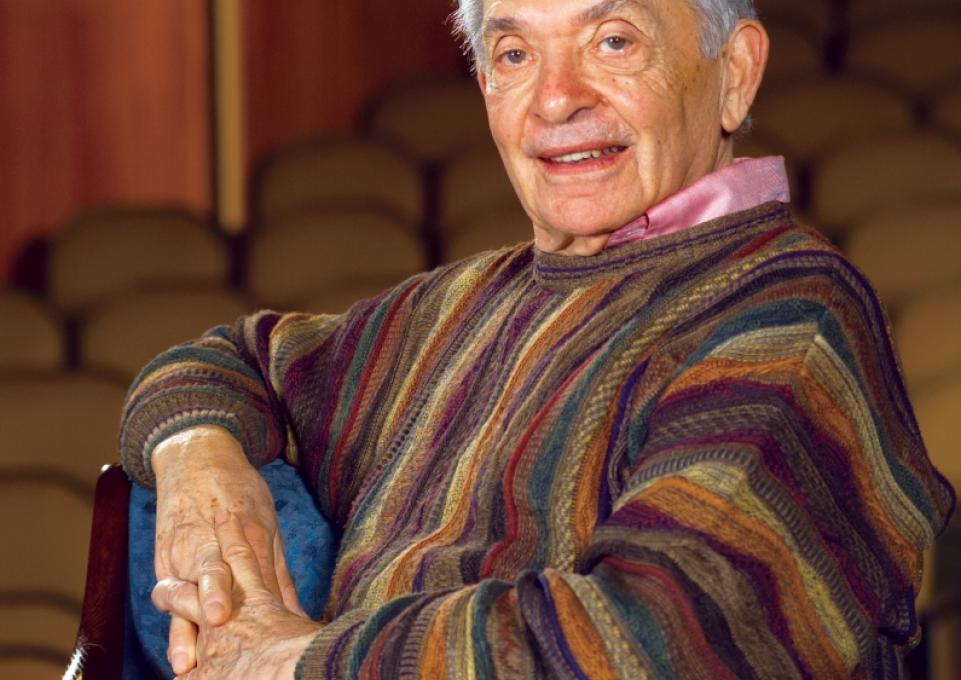
Warren Enters, professor emeritus of performing arts, arrived at Buffalo State in 1968 as a Tony Award–winning producer and accomplished Broadway director (his Tony Award will soon be displayed on campus at the Enters Theatre). He retired from the college in 1992 as one of its most popular and inspirational teachers.
Today, at age 91, Enters is enjoying life at his longtime home in Salem, New York, near the Vermont border. He is currently recording his memories from a lifetime of work in theater.
How are things in Salem, New York?
I’ve had this place in Salem since before I came to Buffalo in the late 1960s. I used to live in apartments in New York City and Buffalo, but I came back to Salem every summer—this is home. It’s beautiful here.
What are you up to these days?
I had a lot of fun experiences during my career, and I’m in the process of recording those stories—through spoken word. People were forever telling me, “You have to record your stories,” so I’m starting to do that.
I still watch quite a bit of theater. I don’t get down to New York City as much as I used to when I had an apartment there, but I have quite a few theater friends who get me out. And I’ve really enjoyed National Theatre Live—the film productions from London’s National Theatre. Movie theaters in Albany and Manchester, Vermont, screen those.
Do you keep up with former students?
Oh, yes, I still hear from former students all the time. I had a number of students who used their talents to move on to big careers in entertainment. Last year, a few of them were at a 90th birthday party for me in New York City. Tom Fontana, Diane English, and Diana [Lanza] Elghanayan—all three are terrific, longtime friends.
I hadn’t done a lot of teaching before I came to Buffalo State, but I found that I loved working with students, particularly those at Buffalo State because they were hungry. And that leads to success for many—when you want something badly enough, you’ll work hard for it.
Speaking of hard work, you were known as the professor who repeatedly encouraged students to “Do something!”
I always told students, “Writers write, actors act, directors direct.” And what I really said, I think, what students remember me saying was, “Are you going to do it, or just talk about doing it?”
Before starting your professional career in theater, you served in World War II. How did that experience influence your art?
I was a theater major at the University of Wisconsin who went into the Navy as a sub chaser out of Boston and the commander of men on a ship in the Philippines. I always said my leadership was like the blind leading the blind, but it was World War II and everyone had to do something! Those three years of my life were a big growing experience—I made friendships in the Navy that lasted a long time.
Of course, any personal experience will influence what you do in theater, but having those big responsibilities—being responsible for other people’s lives—made a deep impression.
The Navy was one of my first experiences with dealing with all kinds of people, including people I probably wouldn’t have been shaking hands with in civilian life. But it showed me that people are not as different as you think. I worked with such a wide variety of people in theater—some horrors, some wonderful; some you loved, some you hoped you’d never see again. It’s important to learn how to deal with all kinds of people.
After the war, you started the Cherry Lane Theatre in New York City with some college friends and won a Tony Award for your work.
It was a very big award for a very small theater. It did present one problem—I always looked very young, and a number of times, when I’d go for an interview, they didn’t believe that this kid had won a Tony!
It was an exciting time. It was just after the war, and lots of people were starting out in theater—a lot of people had delayed the beginning of their careers because of the war. For me, winning the Tony led to other directing jobs in New York City and at regional theaters around the country, including in Buffalo. Life in theater is not simple, but I was very fortunate in a lot of ways over the years to have worked on so many successful shows with so many talented people.
Read more stories in 1300 Elmwood.
